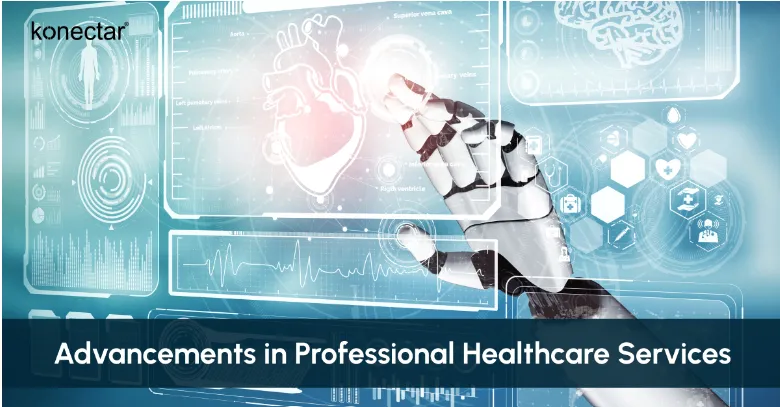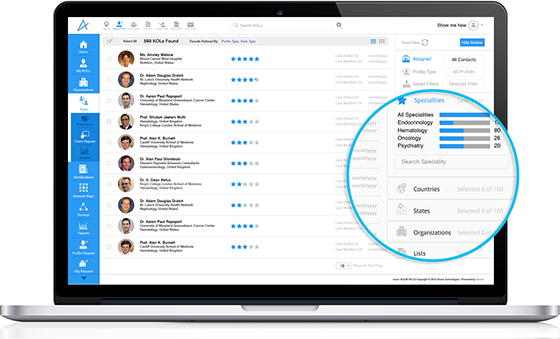23-09-2024
Advancements in Professional Healthcare Services

The evolution of healthcare is no longer a slow-moving process. Today, it’s defined by rapid transformation in Artificial Intelligence (AI) in medical imaging, AI in drug development, and predictive analytics in healthcare.
From clinical diagnostics to operational workflows, AI technologies are being embedded into professional healthcare services to enhance speed, accuracy, and consistency. These are not speculative trends; they are active shifts, already delivering measurable improvements in patient outcomes, setting a new standard for healthcare technology advancements.
In this article:
- 1. AI-Powered Diagnostics in Professional Healthcare Services
- 2. How AI is Revolutionizing Radiology by Enhancing Image Analysis and Interpretation
- 3. AI in Personalized Healthcare
- 4. Virtual Health Assistants: Connecting Patients to Information
- 5. AI in Streamlining Administrative Tasks
- 6. Drug Discovery and Development
- 7. Summing Up
- 8. FAQs
AI-Powered Diagnostics in Professional Healthcare Services
In healthcare, timing is everything. The ability to detect diseases in their earliest stages can drastically improve treatment outcomes. With the growing role of Artificial Intelligence in medical imaging, diagnostic tools are being supercharged to offer faster, more precise assessments.
Machine learning models, trained on vast datasets of imaging, biomarker, and clinical information, can now identify patterns associated with diseases such as Alzheimer’s, cancer, and cardiovascular conditions, often before symptoms appear. This is a striking example of how predictive analytics in healthcare enables proactive treatment planning rather than reactive care.
How AI is Revolutionizing Radiology by Enhancing Image Analysis and Interpretation
Radiology has always been a data-rich field, demanding precision and speed. Traditionally, this workload falls on highly trained radiologists. However, with the integration of artificial intelligence in medical imaging, the process is evolving from image interpretation to intelligent assistance.
AI systems can now analyze thousands of medical images rapidly, identifying abnormalities with remarkable accuracy. These tools “learn” from each scan they assess, continuously improving their ability to detect subtle patterns. This act directly supports clinical workflow optimization by reducing workload and minimizing delays.
AI in Personalized Healthcare
No two patients are the same, and neither are their conditions, responses to treatment, or recovery pathways. That’s where AI plays a pivotal role in crafting personalized treatment plans based on a comprehensive analysis of individual profiles.
By leveraging predictive analytics in healthcare, AI systems can analyze layers of patient-specific data. This allows for identifying individuals at higher risk of chronic diseases, enabling the design of patient-centric care models tailored to their unique needs.
Virtual Health Assistants: Connecting Patients to information
Overpopulation and a need for trained professionals have plagued professional healthcare services for a long time. AI-powered chatbots and support systems are being integrated into clinics, hospitals, and health platforms to deliver 24/7 patient engagement.
These assistants can manage a wide range of tasks, such as symptom triage, appointment scheduling, and medication reminders. While not a replacement for clinical judgment, they enhance healthcare accessibility and ease operational strain, a prime example of streamlining healthcare administration.
In underserved or high-demand environments, these digital tools ensure patients get the support they need, even outside traditional hours.
AI in Streamlining Administrative Tasks
From automating billing and claims processing to ensuring compliance with medical coding standards, AI systems are reducing operational friction in healthcare institutions. Streamlining healthcare administration minimizes errors, speeds up reimbursements, and frees human staff for higher-value interactions.
These efficiencies benefit professional healthcare services financially and in terms of patient experience. A streamlined back office means fewer delays, clinical workflow optimization, more transparent communication, and a more responsive healthcare system overall.
Drug Discovery and Development
Drug development is notoriously time-consuming and expensive. However, AI in drug development is changing that paradigm, often before clinical trials begin.
This is especially relevant in drug repurposing, the process of applying existing drugs to new therapeutic areas. By integrating genomic data, molecular structures, and trial records, AI platforms can suggest novel treatments faster than traditional pipelines ever could, which marks a significant leap in healthcare technology advancements.
In a high-stakes field where every day matters, these insights are more than innovative — they’re lifesaving.
Summing Up
Artificial intelligence in medical imaging, AI in drug development, and predictive analytics in healthcare are not just about algorithms — it’s about outcomes. It’s about enabling professionals to deliver faster, safer, more personalized care while reducing strain on overburdened systems.
From diagnostics to drug development, AI is not replacing human expertise—it’s amplifying it. As this technology matures, healthcare organizations that embrace these innovations in healthcare delivery will improve patient care and shape the future of medicine.
FAQs
- What are the top AI advancements in healthcare?
AI-powered diagnostics, personalized care, virtual assistants, operational automation, and faster drug discovery.
- How does AI aid early disease detection?
By analyzing medical data to identify early risk patterns.
- Is AI already used in hospitals?
Yes, for diagnostics, patient triage, administration, and virtual consultations.
- How does AI support drug development?
By predicting drug interactions and identifying repurposing opportunities.
- Does AI replace doctors?
No. It enhances clinical decisions but doesn’t replace human expertise.





